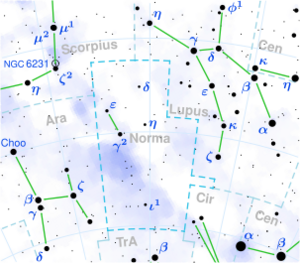Astronomy:2MASS J15404342−5101357
Coordinates: ![]() 15h 40m 43.537s, −51° 01′ 35.968″
15h 40m 43.537s, −51° 01′ 35.968″
| Observation data Equinox J2000.0]] (ICRS) | |
|---|---|
| Constellation | Norma |
| Right ascension | 15h 40m 43.537s[1] |
| Declination | −51° 01′ 35.968″[1] |
| Apparent magnitude (V) | 15.26[2] |
| Characteristics | |
| Evolutionary stage | main-sequence star[2] |
| Spectral type | M7V[2] |
| Apparent magnitude (J) | 8.96[3] |
| Astrometry | |
| Radial velocity (Rv) | 50.0[3] km/s |
| Proper motion (μ) | RA: +1.954[2] mas/yr Dec.: −0.330[2] mas/yr |
| Parallax (π) | 187.7290 ± 0.0496[4] mas |
| Distance | 17.374 ± 0.005 ly (5.327 ± 0.001 pc) |
| Absolute bolometric magnitude (Mbol) | 12.81[2] |
| Details[2] | |
| Mass | 0.090±0.010 M☉ |
| Luminosity | 0.000603 L☉ |
| Temperature | 2621±100 K |
| Other designations | |
| Database references | |
| SIMBAD | data |
Location of 2M1540 in the constellation Norma | |
2MASS J15404341−5101357 (abbreviated 2M1540) is a red dwarf of spectral type M7, located in Norma at approximately 17 light-years from Earth. It is the nearest known M7 dwarf.[2]
Discovery
Its discovery was announced in 2014 by Kirkpatrick et al.[6] and independently by Pérez Garrido et al.[2]
Kirkpatrick and colleagues found a few thousand new high proper motion objects under the AllWISE program of study of images, taken by Wide-field Infrared Survey Explorer (WISE). 2M1540 was one of these high proper motion objects. They named it WISEA J154045.67-510139.3 and assigned it spectral type M6.[6]
Pérez Garrido and colleagues were looking for high proper motion sources in the 2MASS–WISE cross-match. They named it 2MASS J154043.42-510135.7 (2M1540 for short) and classified it as an M7.0±0.5 dwarf.[2]
Since the trigonometric distance of 2M1540 agreed with its spectrophotometric distances, computed for a single object, it was concluded that it is not an equal-mass binary.[2]
References
- ↑ 1.0 1.1 Brown, A. G. A. (August 2018). "Gaia Data Release 2: Summary of the contents and survey properties". Astronomy & Astrophysics 616: A1. doi:10.1051/0004-6361/201833051. Bibcode: 2018A&A...616A...1G.
- ↑ 2.00 2.01 2.02 2.03 2.04 2.05 2.06 2.07 2.08 2.09 2.10 Pérez Garrido, A.; Lodieu, N.; Béjar, V. J. S.; Ruiz, M. T.; Gauza, B.; Rebolo, R.; Zapatero Osorio, M. R. (2014). "2MASS J154043.42-510135.7: a new addition to the 5 pc population". Astronomy & Astrophysics 567: A6. doi:10.1051/0004-6361/201423615. Bibcode: 2014A&A...567A...6P.
- ↑ 3.0 3.1 Henry, Todd J.; Jao, Wei-Chun; Winters, Jennifer G.; Dieterich, Sergio B.; Finch, Charlie T.; Ianna, Philip A.; Riedel, Adric R.; Silverstein, Michele L. et al. (2018), "The Solar Neighborhood XLIV: RECONS Discoveries within 10 parsecs", The Astronomical Journal 155 (6): 265, doi:10.3847/1538-3881/aac262, Bibcode: 2018AJ....155..265H
- ↑ Brown, A. G. A. (2021). "Gaia Early Data Release 3: Summary of the contents and survey properties". Astronomy & Astrophysics 649: A1. doi:10.1051/0004-6361/202039657. Bibcode: 2021A&A...649A...1G. Gaia EDR3 record for this source at VizieR.
- ↑ Golovin, Alex; Reffert, Sabine; Just, Andreas; Jordan, Stefan; Vani, Akash; Jahreiß, Hartmut (November 2022). "The Fifth Catalogue of Nearby Stars (CNS5)". Astronomy & Astrophysics 670: A19. doi:10.1051/0004-6361/202244250. Bibcode: 2023A&A...670A..19G. Catalogue can be accessed here.
- ↑ 6.0 6.1 Kirkpatrick, J. Davy; Schneider, Adam; Fajardo-Acosta, Sergio; Gelino, Christopher R.; Mace, Gregory N.; Wright, Edward L.; Logsdon, Sarah E.; McLean, Ian S. et al. (2014). "The AllWISE Motion Survey and the Quest for Cold Subdwarfs". The Astrophysical Journal 783 (2): 122. doi:10.1088/0004-637X/783/2/122. Bibcode: 2014ApJ...783..122K.
 |


